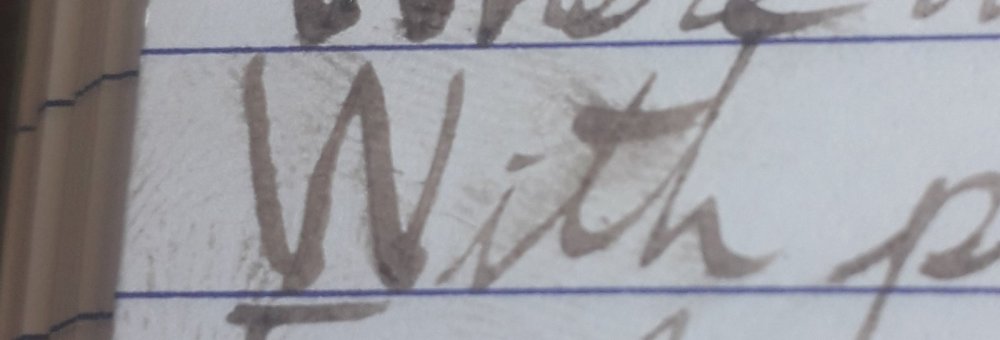Search the Community
Showing results for tags 'tea'.
-
Calling Chemists - What Ingredient is Causing My Homemade Iron Ink to Refuse to Dry?
RememberThePorter posted a topic in Inky Thoughts
Hi There, This is my first post and I made the account to ask this question. This is my homemade ink which I call "Iron Tea: An Englishman's Home", born of experimenting at making a waterproof and lightfast ink using only things that might be found in any English home: I am very please with the colour. It goes on very light and binds to the paper in a much darker shade of brown. There is a lot of variation in the shading and feels very 'homely'. But I have discovered a problem with it. It won't dry. At least, not after 36 hours... which I can only think is a chemical problem as I would expect even the wettest of inks poured onto the page direct from the bottle to dry before then. Specifically, the ink won't dry on anything except cheap newspaper like materials. The images here are from a Clairefontaine notebook. To say it won't dry may not be accurate however, rather, it feels 'tacky' or 'sticky', much like you might expect a thin layer of tree sap to feel like. It is smudgeable, which I discovered by accident like so: My question is, what could be causing this. I can safely eliminate contaminated tools/materials as I have tried on a few and hold myself in the proudest rank of 'clean freaks'. So it may be that something I have put in it is causing it to take forever to dry. The ingredients are as follows: - 10ml apple cidar vinegar steeped nails for few days - 10ml balsamic wine vinegar - 200ml tea (made from boiling down 500ml of tap water with 5 ordinary black tea bags) - 10ml port (for preservation and fun of course (red wine would work just as well I suppose)) - 10ml "100% pure honey" None of these ingredients were measured beyond lazy precision and may be off by a bit. Filtered through a coffee filter before writing. If I had been forward thinking I would have made more iron sulphate solution so that I could just make more and experiment with taking things in and out to see if there are any changes, but since I didn't I figured I'd ask here. I will have to wait a few days before trying again. I have read historical examples which include honey and wine, so my insinct that they are the problem doesn't sit right. Perhaps the apple cidar vinegar? but I can't see why. Is there some chemical in any of the above which which would cause this? Is it just 'honey' doesn't dry ever and will sit on the Clairefontaine paper forever until moved, whereas it would have been absorbed by more historical writing surfaces? I know tea on it's own will dry very fast as I have used that before. Should I have got rain or distilled water, is there some chemical in tap water (chlorine) which causes it to stick and stay wet forever? Is there something natural I can add to it to assist the drying? Should I dilute it? Is there some overlooked process which obviously prevents this exact problem which I haven't seen before? I have done some research and cannot find anything really. Most search engine results are a maze of 'why is the ink drying in my fountain pen' or 'how to make my fountain pen dryer'. *sigh*. Any experience people have making their own inks with any of the above ingredients is much appreciated. (on the plus side, on the cheap stuff it is waterproof and doesn't move a jot even when run under the tap so something must be right there at least). A few closing notes: - Fear not the nature of the ink. I know it is more acidic than a Soviet rainstorm in 1986 and will bore holes in the Nostromo faster than you can say "Jonesy". Don't worry about it - I have been using iron gall inks almost exclusively for over a decade and am well aware of how overblown their danger is on the internet. - Shouldn't I have used pure green Fe (II) sulphate? No because that was not the point of the experiment. - Shouldn't I have used gum arabic instead of honey? No because that was not the point of the experiment. - Won't honey cause it to rot and attract mould etc? Maybe but I don't mind as it is literally cheaper than chips these days and I don't mind if my entire batch of ink or what I write with it catches fire. - What about iron galls, they have much better tannin content and less bad things in it than tea, shouldn't you have used them instead of tea, No because that was not the point of the experiment. This was made for fun and is going to be imperfect - don't worry about it . Help, ideas and inspirations all appreciated! Thank you all! -
I just noticed these today on AliExpress: which are purportedly new limited-edition, market-exclusive colours for China. They are listed by that seller at the same price as the gold-trimmed translucent colours in the regular line-up (Bourgogne, Laurel Green, Chartres Blue); the available nib options are F and M only. The net price of US$112.55 (plus tax, where applicable), after automatic and/or easily accessible discounts, is marginally less than the Japanese domestic market MSRP of ¥18,000(+tax) for the regular colours going by today's exchange rates. Free international shipping included (at least for Australia, Belgium, Mexico, UK, US and Zimbabwe, as far as I've checked just now). The inclusion of a converter with silver trim in the retail package seems a bit out of place for either of those colours, especially when previously the silver-trimmed converters are sold at a slight premium over the ‘standard’ gold-trimmed ones.
- 10 replies
-
- xihu (west lake)
- cha (tea)
- (and 8 more)
-
So by now We all know how everyone here likes our Coffee and Tea, but how about Whats our favorite way to make it. Rather than use silly words lets see your best rendition of your brewing or steeping setup. Hario V-60, and Chinese tea infusing mug:





desaturated.thumb.gif.5cb70ef1e977aa313d11eea3616aba7d.gif)

